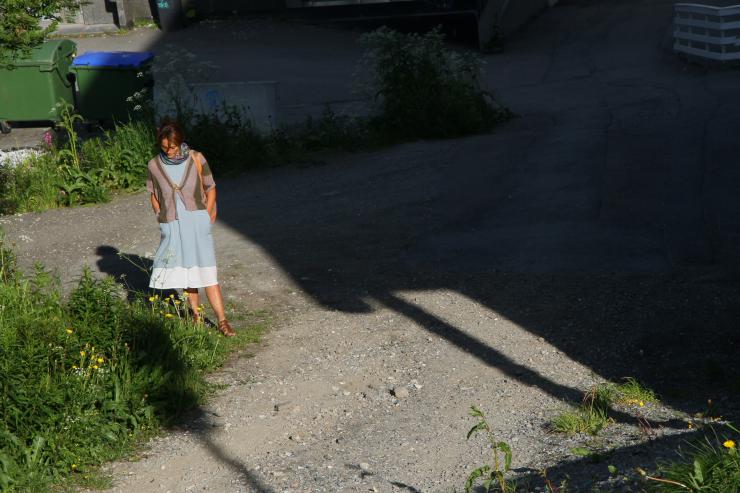Laura, or Scenes from a Common World began for me as a desire to learn about a woman who returns to her home place. Her home place is where her memoires are most vivid and where, in time, she has learned to feel empathy for other people. When we first meet Laura, she is asking a question she herself cannot abandon. The question is, in Laura’s words, “So we must ask ourselves—what did we come here to see?” I believe it is a question that Laura has asked herself long before she has returned home. For us, as readers and participants in her story, Laura’s question is more than a question. It is an invocation that seeks our attention and begs for our willingness to stop.
For Laura, her memories mark her return home. Yet her return home does not leave her without contentions. As most of us are aware, the unknown reaches farther than what we know. Then for some of us our obligation, or perhaps we could say our calling, is to continue looking for what may always be beyond our knowing. We see Laura in places where her memories are sharp. We see her standing on a bridge where a boy has left her, and later we see her in her father’s house where she remembers a time soon after her first wound of love. It is no ordinary love that wounds her, but a first love—that ever promising, mythological creature that evolves from a real person then joins irrevocably with a place. The encounter and loss of a first love has consequences that run long, the wound sinking ever deeper into a person’s experience.
And Ovid’s stories are never static. They bloom within themselves. A single encounter is full of passion, images, consequences, echoes of other myths and characters, allusions and whispers for us to hear and imagine.
Naturally stories of love and loss are old, maybe the oldest the stories we have. After I started writing Laura, I remembered an old story I read in university. That story was “Apollo and Daphne,” as recorded by the Roman poet Ovid in Metamorphoses. Metamorphoses is a book filled with stories about change, many of them involving love. And Ovid’s stories are never static. They bloom within themselves. A single encounter is full of passion, images, consequences, echoes of other myths and characters, allusions and whispers for us to hear and imagine.
While writing Laura, I revisited Apollo being overwhelmed by love released from Eros’s golden-tipped arrow, and Daphne’s inevitable flight after being struck by a second arrow; only this one was dull and lead-tipped. There are no pleas or cures that will alter either Apollo or Daphne from their course. Apollo pursues because of hope, while Daphne flees because of fear. Hope and fear are involved in every experience of love, and I would argue both emotions appear in each individual caught in love’s enchantment. Hope and fear in the context of love are emotions we should certainly recognize. Sometimes our recognition may be so strong we slide lower in our chairs when we read stories like “Apollo and Daphne” because love, even reading about love, should leave us a little uncertain and overwhelmed.

Similar to Daphne, Laura flees as a consequence of love’s other agony, which ultimately is fear. We learn this in the beginning of the poem when she recalls her boy on a bridge and after he is gone there is suddenly “nothing.” But Laura also returns home because of love. Her return to her father’s house is not unlike Daphne’s cry for her father’s help. Yet Laura is not a replication of Daphne. Her return home begins not with a plea, but after an unexpected practice of attentiveness. In her days of a living beside a river, Laura has learned to build fires, learned to pick-up stones and bones, and learned to be alone and to sit still. She comes to realize there is a constant vulnerability in worlds she otherwise believed were immune to change. This realization comes after she has looked closely at where she is and at the world around her. Looking closely and the attention it requires are important steps towards empathy.
Yet another part of our attention, and one that is perhaps necessary for empathy, is to recognize the inherent gift in things, in moments, and in others. We notice this recognition in Laura when she remembers peeling apples, looking outside of a window, an old man who took his wife’s hand, or a young girl who could not sleep because of a cuckoo bird. We might notice too that there are no demands made by these moments, or the people in them. No demands are made by the old woman with her rag tied hair. Instead, Laura must receive the inherent gift within them. In order for her to do this, she must make an admission of the gift’s reality, and I believe stopping is such an admission.

Yet these experiences—looking closely, the discovery of attention and recognition, the admission of a gift, and even stopping—do not free Laura from contention. Home is where Laura assembles her memories and where she lives with her awareness of gift. Living in her home place, she has shifted her habits towards an empathic fulfillment. She realizes there are worlds beyond her knowing, and to seek them she must again change. She understands this while waiting beside another window. She takes into account her late father’s collections and what she has tried “to grow.” But she discovers that these things are now full of traces that lead her away from home. She can know nothing more of them. She cannot be sure of her direction, and neither can we. It is this dubiety that Laura comes another step closer to us, and our perspective. She returns with a shiver of her hands back into earth, understanding that she cannot completely leave. What she will seek or what will flower are questions we are left with, but for our short moment with Laura, the answers will remain silent.
Source: http://howlround.com/laura-or-scenes-from-a-common-world-returns-love-and-ovid-s-lessons-of-change
